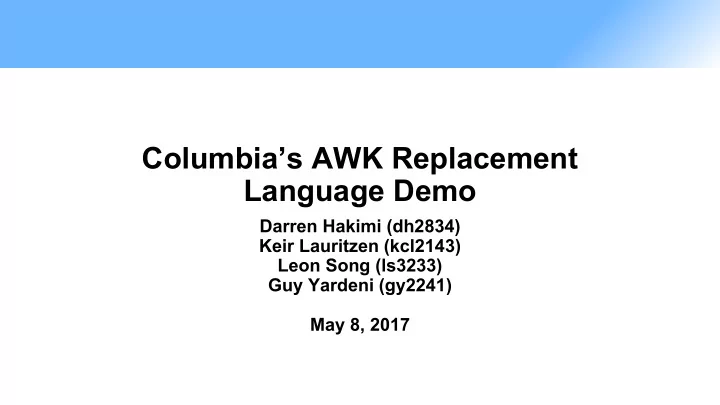

Columbia’s AWK Replacement Language Demo Darren Hakimi (dh2834) Keir Lauritzen (kcl2143) Leon Song (ls3233) Guy Yardeni (gy2241) May 8, 2017
Language Features • Compiled AWK-like language used for text processing • Pattern Action • .carl files compiled to LLVM • Linked with CARL library to form executable • Supports regular expressions • //regex// delimiters • Ranges, concatenation, closure, choice • Regex is syntactically-checked at runtime • Three types (like AWK): • Floats • Strings • Associative arrays (hash tables) • Void for functions • Control flow (If, while, for)
Language Syntax function type function_name(type formal){ type local_var; C-like typed variables, formals, func. return; Function variables are local } BEGIN { type global_var; } AWK’s PATTERN-ACTION Syntax //pattern// {action; } AWK’s Special Patterns: BEGIN / END END { print(global_var); } All variable are global AWK’s repeated processing on text inputs
Carl Engine Implementation … …
Carl Engine Implementation carl_engine.cpp carl_source.ll int main(){ int NPAT = 2; opens the file; char RS = '\n'; __init() char FS = ' '; parse using RS, FS char* patterns[NPAT]; for (int i; i < NPAT, i++) void (*actions[NPAT])(int, char**, for each record { int*); make_c_arrays(FS) void __init() regex(pattern[i]) void destroy_all() if regex.match (*action[i]) (int len, char** cfields, int* cfl) ● Externally CARL supports Float, String, Array, Void } ● Internally CARL supports Float, Int, Int*, Char, destroy_all() return 0; Char*, Char**, (*Func.), (*Func.[]), Char*[], Void } ● Functions and variables built at compile time in semant.ml (not externally visible)
Array Implementation • CARL arrays behave like Hashmaps • We implemented arrays by creating wrappers around an existing C library and linking them with the CARL engine • Wrapper functions: • create(): called by doing myArray = [] • destroy(): called automatically by the engine at the end of every program • array_add_float(): myArray[“key”] = 42.0 • array_add_string(): myArray[“key”] = “Thanks for all the fish” • array_retrieve_float(): float temp = myArray[“key”] • array_retrieve_string(): string temp = myArray[“Arthur Dent”] https://github.com/petewarden/c_hashmap
Testing Approach - Types of tests: - Rundown of buildcarlp script - float, string, array tests - redirect .carl test file to carlc - arithmetic operations executable built by buildcarl and - if/else statements output the LLVM code to .ll file - functions with each return type - convert .ll to assembly .s file - regex - compile .s file and create .o file - Rundown of the testall script: - compile wrapper.o file used with arrays, carl_engine.o and test .o - for each test file, run buildcarlp to file created in the prior step to create a executable file form .test executable for running - run executable with input .txt file the test. as argument - store output in .generated file - check if expected .out file matches with .generated and output .diff file
Demo 1 function float slight_increase(float val) { return val * 1.1; } BEGIN { float float_val1 = 4.321; string string_val1 = "I'm just a string."; } //float// { while (float_val1) { print_float(float_val1); float_val1 = float_val1 - 1; float_val1 = slight_increase(float_val1); } } //string// { if (string_val1) { print_string(string_val1); while (string_val1) { print_string(string_val1); string_val1 = ""; } } } END { if (float_val1 > 4.0) { print_string("strings are the best"); } else { print_string("floats are the best"); } }
Demo 2 BEGIN { float temp_float; array_float myArrayFloat1 = []; array_float myArrayFloat2 = []; array_string myArrayString1 = []; string str = "key1"; float val = 1; myArrayString1["abc"] = "2"; myArrayString1["def"] = "MEANING OF LIFE?"; myArrayFloat1[str] = val; myArrayFloat2[str] = myArrayFloat1[str] * 42; } END { string temp_string; temp_string = myArrayString1["abc"]; print_string(temp_string); temp_string = myArrayString1["def"]; print_string(temp_string); temp_float = myArrayFloat2[str]; print_float(temp_float); }
Demo 3 BEGIN { //Hitchhiker|Guide|Galaxy|Hitch Hiker//{ float a = 0; d = d+1; float b = 0; myArray["Any"] = d; float c = 0; } float d = 0; //a*// { float e = 0; e = e+1; array_float myArray = []; myArray["total"] = e; string hiker = "key"; } } END { //Hitchhiker|Hitch Hiker// { print_string("Hitchhiker:"); a = a+1; print_float(myArray["Hitchhiker"]); myArray["Hitchhiker"] = a; } print_string("Guide:"); //Guide// { print_float(myArray["Guide"]); b = b+1; myArray["Guide"] = b; print_string("Galaxy:"); } print_float(myArray["Galaxy"]); //Galaxy// { c = c+1; print_string("Any:"); myArray["Galaxy"] = c; print_float(myArray["Any"]); } print_string("total:"); print_float(myArray["total"]); }
Recommend
More recommend